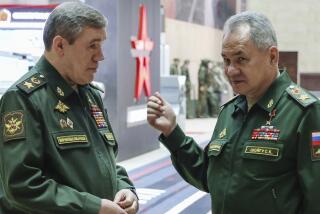Judge Who Issued Chalabi Search Warrant Beset by Death Threats
- Share via
BAGHDAD — The anonymous telephone calls started Thursday, just hours after the raid on Iraqi politician Ahmad Chalabi’s home and office.
“We’ve hired 100 professional assassins to kill you,” a man told Judge Zuhair J. Maliky on Sunday morning. “We are collecting information about you and buying weapons right now.”
As he nervously ran his fingers over a strand of green prayer beads, Maliky -- the chief investigative judge of Iraq’s Central Criminal Court and the man who had issued the search warrant -- said he had received more than a dozen death threats.
“I stopped counting,” he said.
In an interview, the U.S.-appointed judge staunchly denied that the United States would have access to any evidence collected, including computers, documents and weapons.
Maliky said he had heard reports that aides to Chalabi -- a onetime U.S. ally who is now an outspoken critic of the occupation -- were suspected of having passed intelligence to Iran. He insisted that those allegations were not part of his investigations and were not a motivation behind the raid.
“This is purely an Iraqi investigation,” the judge said. “People are trying to use it to exert political influence. But we are simply investigating some Iraqis accused of violating ordinary Iraqi laws.”
Maliky said the investigations involved five separate cases and at least 15 people accused of kidnapping, torture, fraud and theft of government property. Neither Chalabi nor his party, the Iraqi National Congress, is a target of the probes, the judge said. However, he has issued 15 arrest warrants for employees or associates of the INC.
One of Maliky’s investigations involves a former Chalabi appointee to the Finance Ministry, Sabah Nouri, who was arrested in March after auditors discovered that tens of millions of dollars were unaccounted for following the adoption of a new Iraqi currency. Among other allegations, Nouri was accused of illegally detaining bank tellers he had accused of stealing the money.
Another investigation involves the recent kidnapping of a Baghdad cardiologist who said he recognized some of his captors as INC employees before he was blindfolded and tortured for ransom.
“We have no political aims,” Maliky said about the investigations. “We are just trying to enforce the law.”
The much-publicized raid on Chalabi’s house has thrown the 38-year-old Maliky into the center of a mounting political storm that is testing the delicate balance of power in Iraq’s evolving government.
The U.S.-backed Governing Council condemned the raid, which it characterized as an insult to one of its leading members. In a statement, the council questioned whether there had been enough evidence to raid Chalabi’s house.
But Maliky said Iraq’s new judiciary should be free to pursue justice, no matter where it leads.
“The Governing Council claims they want to create a free, democratic Iraq,” the judge said. “But is there to be immunity for members of the council? Saddam Hussein had immunity. But all the immunity has ended. Nobody is above the law.”
Dara Noureddine, a council member and fellow judge, said the council did not intend to condemn Maliky.
“The judge should be free to issue any order he wants,” Noureddine said. “The council has no right to interfere with the judge’s job.”
But Noureddine said council members were disturbed by the raid on Chalabi’s house and the aggressive manner in which police had executed the order. Chalabi alleged that Iraqi police, backed by U.S. soldiers, had broken down doors, smashed furniture and stolen money and food.
Noureddine said council members were skeptical that evidence or suspects would be found at Chalabi’s house and believed that the judge should have consulted with members before issuing the order.
Chalabi “is a member of the Governing Council,” Noureddine said. “He should be treated with respect.”
Maliky said he had reason to believe that suspects had been staying in Chalabi’s house. After the Governing Council came forward to support Chalabi, a handful of Iraqis, including one council member and the chief judge of the court, offered their support to Maliky, he said.
But over the weekend, the judge faced mounting criticism. One Iraqi newspaper quoted Chalabi backers accusing Maliky of being a Baathist supporter who had signed the arrest warrant for radical cleric Muqtada Sadr, whose militia has been clashing with U.S. troops in southern Iraq.
Maliky said his family had been enemies of Hussein’s regime for decades, and he denied involvement in the Sadr case. A court official confirmed that another judge had signed the Sadr arrest warrant.
Maliky said he had been a private lawyer in Iraq, unable to get a government job because an uncle had opposed a previous regime and was killed in 1968.
“I didn’t arrive in Iraq on an American tank,” he said, referring to Chalabi’s return to Iraq with U.S. forces last year. “I didn’t oppose the Saddam Hussein regime from five-star hotels in London and Washington. I didn’t take money from the U.S.”
Maliky vowed not to be intimidated, but he said he had contacted the U.S.-led Coalition Provisional Authority to request additional security.
“I could be killed today, tomorrow or any day,” he said. “That is something that every man in Iraq faces. But a judge should not be scared or subject to any other person. At least I know my son will be able to say proudly, ‘I am the son of Zuhair.’ ”
More to Read
Sign up for Essential California
The most important California stories and recommendations in your inbox every morning.
You may occasionally receive promotional content from the Los Angeles Times.










